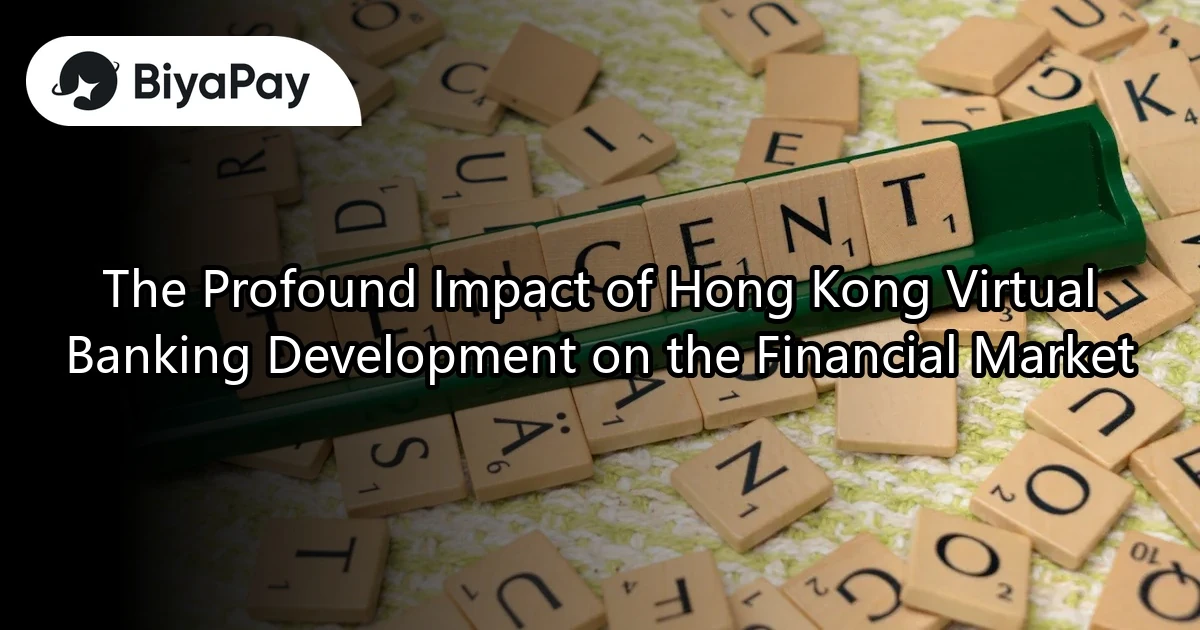- EasyCard
- Trade
- Help
- Announcement
- Academy
- SWIFT Code
- Iban Number
- Referral
- Customer Service
- Blog
- Creator
The Profound Impact of Hong Kong Virtual Banking Development on the Financial Market

Image Source: pexels
Virtual banks have become a significant driver of digitalization in Hong Kong’s financial market in recent years. The Hong Kong Monetary Authority (HKMA) has implemented the “FinTech 2025” strategy, prompting over 40 banks to participate in data infrastructure, processing approximately 19,000 loan applications and approving about USD 2.18 billion in credit (based on an exchange rate of 1 USD to 7.8 HKD). Artificial intelligence, distributed ledger technology, and virtual asset regulations have driven improvements in bank approval efficiency, intensified market competition, and accelerated the pace of digital transformation.
Key Points
- Virtual banks operate through digital platforms, reducing costs and enhancing service efficiency, driving the digital transformation of Hong Kong’s banking industry.
- Artificial intelligence and blockchain technology are widely applied in virtual banks, improving customer experience, security, and risk management capabilities.
- The HKMA actively supports virtual bank development, ensuring market stability and consumer rights through policies and regulations.
- Virtual banks promote inclusive finance, providing personalized loans and low-fee accounts to more citizens, expanding financial service coverage.
- Cross-border cooperation and green finance are key focuses for the future development of virtual banks, promoting Hong Kong as an international fintech hub.
Virtual Banks vs. Traditional Banks

Image Source: unsplash
Changes in Business Models
In 2024, the HKMA published a review report stating that virtual banks have successfully achieved policy objectives and established a level playing field with traditional banks. Virtual banks operate without physical branches, relying on digital platforms, significantly reducing operating costs. This model has prompted the entire industry to rethink resource allocation and service processes. Traditional banks have also actively pursued digital transformation, with 86% adopting fintech solutions to improve operational efficiency.
Digital transformation brings multiple benefits:
- Digitally leading banks have a price-to-earnings ratio (P/E Ratio) 2.6% higher than laggards, with a 4% higher return on tangible equity (ROTE).
- Digital sales have increased from 40% to 70%, far exceeding the 8% to 17% range for laggards.
- Cathay Financial Holdings and Cathay United Bank have enhanced customer experience and innovation capabilities through big data, AI, and automated processes, earning multiple international awards.
Virtual banks focus on online services, enabling rapid responses to market demands and optimizing product design through data analytics. This flexibility drives continuous innovation in Hong Kong’s banking business models.
Competition and Cooperation
The entry of virtual banks has accelerated the digitalization pace of traditional banks. Both sides influence each other in product innovation, service experience, and cost structures. Traditional banks leverage AI technology to improve fraud detection efficiency, with 58% applying it extensively and 32% using it partially. AI automation of routine tasks makes bank operations more efficient.
- 81% of bank IT executives believe that unlocking AI value will determine a bank’s success or failure.
- 78% believe integrating AI into products and services helps achieve business goals, with 46% considering the benefits extremely high.
- 62% agree that the complexity and risks of personal data processing in AI projects outweigh the benefits to customer experience.
Virtual banks not only compete but also cooperate with traditional banks. For example, some traditional banks share fintech infrastructure with virtual banks, promoting industry standardization. This competitive-cooperative relationship fosters continuous innovation and development in Hong Kong’s financial market.
Fintech Innovation
Artificial Intelligence Applications
Artificial intelligence technology is rapidly transforming the service models of Hong Kong’s virtual banks. Generative AI drives personalized services, helping banks design products based on customer behavior data. Intelligent AI chatbots improve customer satisfaction by responding to inquiries instantly. AI is also applied to anti-money laundering and fraud detection, automatically analyzing transaction patterns and issuing alerts. Cloud solutions accelerate AI deployment, enabling banks to introduce innovative tools more flexibly. According to 2024 data, the global fintech market’s AI segment is valued at approximately USD 44.08 billion, expected to grow to USD 50.87 billion by 2029, with a compound annual growth rate of 2.91%. McKinsey estimates that full implementation of generative AI could create USD 200 billion to 350 billion in additional annual value for the banking industry. Hong Kong banks actively adopt AI for credit scoring, customer relationship management, and loan underwriting, enhancing operational efficiency and risk management capabilities.
AI technology not only improves service efficiency but also strengthens data governance and compliance, helping banks maintain a competitive edge.
Blockchain and Virtual Assets
Blockchain technology brings greater transaction transparency and security to virtual banks. Its decentralized database and tamper-proof features ensure all transaction records are instantly traceable. Smart contracts, coupled with anomaly detection, further enhance service efficiency and risk control. The Hong Kong government actively promotes virtual assets and blockchain development, accelerating virtual asset platform licensing and collaborating with tech giants like Microsoft to build enterprise-grade virtual asset trading infrastructure. Blockchain facilitates cross-industry data exchange, enhancing financial transaction safety and efficiency. In 2023, multiple banks adopted AI and DLT technologies for credit risk management and investment advice, promoting inclusive finance and innovation.
- Blockchain core features include tamper-proof data, decentralized databases, transparent data, and permanently recordable data permanently recorded.
- Smart contracts combined with big data analytics enhance transaction safety and efficiency.
Regulation and Supervision
Policy Support
The HKMA actively promotes the healthy development of virtual banks. In 2025, the HKMA issued its second virtual asset policy declaration, explicitly supporting fintech innovation. The regulatory sandbox program allows banks to test new products in a controlled environment, reducing risks. The market risks declaration emphasizes multiple Hong Kong banks have utilized the sandbox to pilot AI-driven credit scoring and blockchain payments, improving service efficiency. The policy statement emphasizes sustainability, encouraging banks to adopt green finance solutions. The government has also accelerated the licensing and virtual asset platform licensing, promoting compliant operations. According to the latest data, Hong Kong’s virtual banks’ total assets surpassed $3 billion in 2024, demonstrating significant regulatory support’s effectiveness
The policies of the Monetary Authority bring three major benefits to the market:
- Accelerating the pace of financial innovation
- Strengthening market confidence
- Safeguarding consumer rights and interests
Risk Management Framework
Regulatory bodies emphasize the balance between market stability and innovation. The HKMA requires virtual banks to establish strict risk management frameworks, including capital adequacy, cybersecurity, and anti-money laundering measures. Hong Kong banks widely adopt AI to monitor transaction anomalies, detecting suspicious activities promptly. Some banks have introduced multi-factor authentication, authentication to ensure user fund safety. Regulatory authorities regularly review bank compliance to ensure all operations meet standards international standards. In 2024, Hong Kong virtual banks’ average capital adequacy ratio reached 16%, exceeding the international minimum requirement. These measures effectively reduce risks and maintain market stability.
Experts suggest that banks should continue investing in regulatory frameworks and compliance technologies to enhance risk resilience and ensure sustainable industry growth.
Customer Experience Transformation

Image Source: unsplash
Digital Convenience
Virtual banks actively apply artificial intelligence and automation technologies to enhance users’ digital experiences. Customers can apply for loans anytime, through mobile apps for loans, account opening, or payments. These services eliminate the need for in-person visits, saving significant time. For example, a Hong Kong virtual bank allows customers to upload identification documents, with the system automatically completing identity verification, AI-driven chatbots respond to inquiries 24/7, addressing common issues. According to 2024 data, Hong Kong virtual banks have reduced average loan approval times to within 10 minutes, significantly faster than traditional banks. User interfaces are designed for simplicity, accommodating users of all ages. Most virtual banks support multi-currency transfers, calculated at an exchange rate of 1 USD to 7.8 HKD, facilitating international transactions.
Experts note that digital convenience has become a key competitive factor in Hong Kong’s banking industry, enhancing overall customer satisfaction.
Inclusive Finance
Virtual banks promote inclusive finance, enabling more citizens to access basic financial services. Traditional banks impose higher barriers for low-income or individuals with insufficient credit. Virtual banks leverage big data and AI to assess repayment capacity, offering tailored loan solutions for diverse backgrounds. This approach enhances financial inclusivity. Some Hong Kong virtual banks introduce low-fee or no-fee accounts, accounts for no monthly fees, easing burdens on low-income citizens. Banks also prioritize data security, employing multi-layer encryption to protect user information. According to a 2024 survey, over 70% of respondents believe virtual banks have increased their trust in financial institutions.
- Benefits of inclusive finance include:
- Expanding financial service coverage
- Lowering service barriers
- Strengthening data security and trust
Virtual Banks Shaping the Future Ecosystem
Green Finance
Virtual banks actively participate in green finance, promoting sustainable development. Multiple banks integrate ESG principles, leveraging blockchain for enhanced transparency in carbon trading. For instance, platforms like BCT and Creol blockchain, blockchain carbon support Amazon rainforest carbon offset projects, enabling businesses and individuals to participate in emissions reduction. Taiwanese green project loans have exceeded $258.7 billion in financing, encouraging enterprises to invest in green energy and emissions reduction infrastructure. Insurance industries also launch green auto and home insurance, linking data via technology to promote energy efficiency. Virtual banks integrate Web3 and stablecoin ecosystems, introducing innovative applications for green finance products.
Cross-Border Collaboration
Hong Kong, as an international fintech hub, actively collaborates with Singapore, London, and other regions. Singapore’s Monetary Authority attracts regulatory sandbox and fintech festival, attracting over 1,000 fintech firms, emphasizing ecosystem collaboration. The UK’s FCA regulatory sandbox covers blockchain payments, RegTech, and anti-money laundering, fostering multinational partnerships. Hong Kong hosts over 600 fintech firms, spanning mobile payments, cross-border wealth management, and virtual asset trading. Over the past five years, the Hong Kong government has invested over HKD 150 billion (USD 1.8 to 7.8 HKD) to support innovation. Despite challenges in policy openness and talent reserves, Hong Kong virtual banks excel in cross-border payments, digital assets, and Web3 applications, demonstrating strong competitiveness through fintech.
- Cross-border collaboration priorities include:
- Building diverse ecosystems
- Advancing blockchain and digital currency applications
- Cultivating fintech talent
Virtual banks in 2025 drive Hong Kong’s financial market digitalization, enhancing innovation capabilities. These banks promote inclusive finance, enabling more citizens to access financial services. Green finance and Web3 ecosystems foster sustainable economies. Experts recommend sustained industry policy innovation, cross-border collaboration, and refined virtual asset regulations to ensure Hong Kong’s international competitiveness.
FAQ
What are the main differences between virtual banks and traditional banks?
Virtual banks operate without physical branches, providing all services on digital platforms. This model reduces operating costs and enhances efficiency. Multiple Hong Kong virtual banks have adopted this approach, driving industry innovation.
How do Hong Kong virtual banks ensure user fund safety?
Hong Kong virtual banks employ multi-factor authentication, encryption, and AI to monitor suspicious transactions. The HKMA mandates capital adequacy ratios meeting international standards, averaging 16% in 2024, ensuring user fund safety.
What inclusive finance services do virtual banks offer?
Virtual banks use AI and big data to design tailored loan plans for low-income or credit-limited individuals. Some offer low-fee or no-fee accounts, expanding access to financial services.
How do Hong Kong virtual banks participate in green finance?
Multiple virtual banks leverage blockchain for transparent carbon trading. They offer green loans and insurance products, supporting businesses and individuals in emissions reduction, promoting sustainability.
What advantages do virtual banks have in cross-border financial collaboration?
Hong Kong virtual banks collaborate with Singapore, London, and others, advancing cross-border payments and Web3 applications. These partnerships enhance fintech competitiveness and facilitate international capital flows.
Traditional banking’s high costs and cumbersome processes limit flexible investments and cross-border transfer efficiency, while high barriers to green finance independently constrain sustainable investment opportunities. BiyaPay, as an all-in-one financial platform, enables real-time US, HK, and green finance investments without complex procedures, simplifying global fund management. Platform remittance fees are as low as 0.5%, covering 190+ countries with same-day transfers. Its flexible savings product offers a 5.48% annualized return, with daily interest credited automatically and withdrawals anytime, supporting 30+ fiat and 200+ cryptocurrencies, secured by KYC.
Try BiyaPay now to start your global investment journey! Join BiyaPay for efficient fund management!
*This article is provided for general information purposes and does not constitute legal, tax or other professional advice from BiyaPay or its subsidiaries and its affiliates, and it is not intended as a substitute for obtaining advice from a financial advisor or any other professional.
We make no representations, warranties or warranties, express or implied, as to the accuracy, completeness or timeliness of the contents of this publication.




Contact Us
Company and Team
BiyaPay Products
Customer Services
is a broker-dealer registered with the U.S. Securities and Exchange Commission (SEC) (No.: 802-127417), member of the Financial Industry Regulatory Authority (FINRA) (CRD: 325027), member of the Securities Investor Protection Corporation (SIPC), and regulated by FINRA and SEC.
registered with the US Financial Crimes Enforcement Network (FinCEN), as a Money Services Business (MSB), registration number: 31000218637349, and regulated by FinCEN.
registered as Financial Service Provider (FSP number: FSP1007221) in New Zealand, and is a member of the Financial Dispute Resolution Scheme, a New Zealand independent dispute resolution service provider.



















